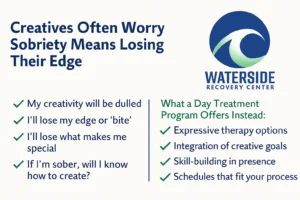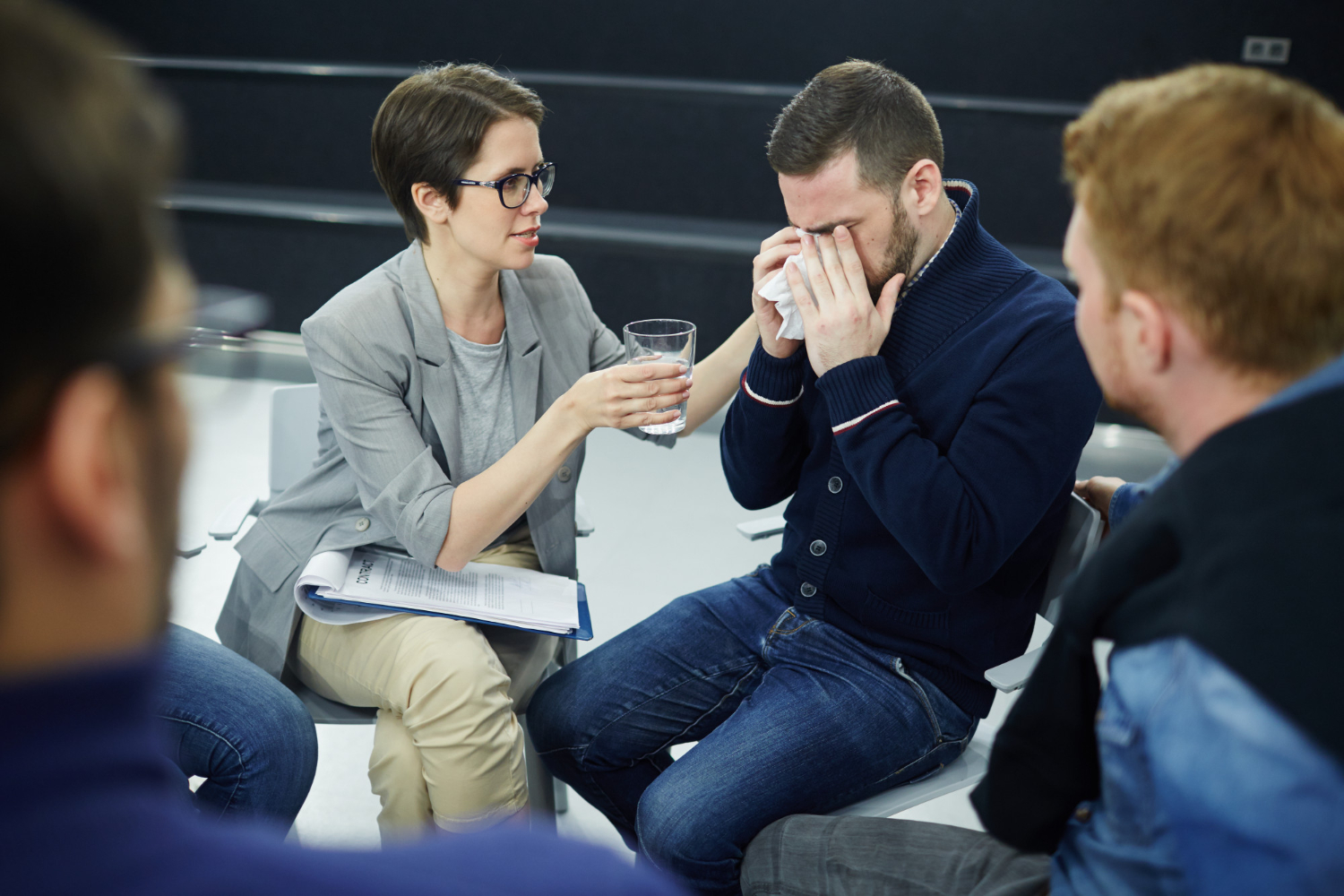You’ve always believed your art was the last honest thing you had. The quiet rebellion in brush strokes, the melody whispered at 2 a.m., the way your fingers knew the shape of creation before the world told you how to feel it.
And now you’re staring at a different question: What if I lose myself when I stop drinking (or using)? Because you’ve built a self around the tool, the edge, the coping mechanism. You’ve convinced yourself that without it you’ll vanish.
But here’s a truth you’re allowed to believe: You’re not broken. You’re becoming.
At Waterside Recovery Center we offer a day treatment program that helps creatives like you reclaim your identity—without losing your spark, and without giving up your life. You don’t leave creation behind. You bring it into the light.
You’re Worried That Sobriety Means Silence
If you’re reading this, part of you is afraid. Afraid that sobriety will strip away your edge, your “special sauce,” the chaotic fuel you’ve believed you needed to make art.
“If I stop using, will I still feel things deeply enough to create?”
That worry deserves respect. And so does your art. The fear isn’t irrational—it’s protective. It’s saying: My creativity keeps me alive. I don’t want to die.
Here’s what we know: the substance may have helped you feel, but it also dulled you. It blurred your vision. It took your morning clarity. It stole your nights and left you half‑present.
A day treatment program doesn’t ask you to stop creating. It asks you to start showing up for yourself—and for your art—in a new way.
What a Day Treatment Program Looks Like for Artists
You don’t have to disappear from your studio. You don’t have to drop your gig or your project. A day treatment program is designed to fit your life, not break it.
In Massachusetts, a day treatment setting means structured, intensive care during the day—then you return home at night.
Here’s how it might look for you:
- You arrive in the morning. You go to group or individual therapy that understands creative brains, performance anxiety, fear of silence.
- You talk about triggers—but also about your medium: the paint, the pen, the stage. We don’t ignore your art. We incorporate it.
- You practice coping, regulation, presence—so when you return to your studio you’re not running on fumes.
- Evening: You go home. You pick up your instrument or brush or laptop. You live your creative life again—with more clarity, more stamina.
Looking for a Day Treatment Program in Marshfield, MA? You can keep your roots in your world while you rebuild your foundation.
Your Identity Isn’t the Problem—It’s the Gear Shift
You’re not “elevated because of the bottle.” You’re resilient because you’ve learned how to push yourself. You’re imaginative because you’ve felt deeply. You’re talented because you’ve stayed awake while others slept.
But your coping mechanism became the loudest voice. The truth is: you’re more than your substance or your routine. Your art doesn’t come from the bottle. It comes from you. But the bottle made that harder to reach.
A day treatment program helps you shift gears—not erase your engine. It repairs the transmission so you can drive the road you meant to take.
Community for the Creatively Wired
Too many creative people fear that treatment means being around folks who don’t understand them—who don’t see the nuance, the midnight oil, the fuel‑and‑flame lifestyle.
Here’s what we want you to know: you’re not alone. There are other people whose identity is tied to their output. Who fear silence more than failure. Who worry their voice is their brand—and what happens if that brand fades.
Your circle matters. A day treatment program gives you peers who know it isn’t just about “stop drinking.” It’s about write again, paint again, feel again—and live again.

What You Can Expect: The Artist Edition
Here are some tweaks that honor your creative self:
- Expressive therapy options: art therapy, writing groups, music‑inspired sessions. Your craft is valid and present.
- Scheduling that fits your flow: morning check‑in, midday therapy, afternoon return. You don’t have to vanish for months.
- Integration of creative goals: talk about how you’ll face performance, how you’ll face deadlines, how you’ll face the mirror when you’re sober and raw.
- Skill‑building in presence: how to be in your body, in your breath, in your timeline—so when inspiration hits, you’re awake for it.
Looking for a Day Treatment Program in Bristol County, MA? We meet you where the canvas is still blank.
The Risk Isn’t in Getting Help—It’s in Staying Unchanged
You might think: If I go sober, I’ll lose bookings. My creativity will dry up. I’ll become someone boring.
Here’s the wake‑up call: what’s at risk now is already in motion. Maybe your art is surviving—but it’s not thriving. Maybe you show up, but your work is heavier. Maybe you’re inspired, but you’re always two drinks ahead.
Doing nothing won’t protect your art—it will taint it.
Helping yourself doesn’t erase your identity—it expands it.
A Reminder: You’re Becoming
This isn’t about tapping “reset” and pretending you’re the person you were at 22. It’s about becoming who you are next.
The part of you that still creates while tired. The part of you that still believes there’s something worth saying. The part of you that’s ready to show up for your own story.
Treatment isn’t about erasing your past. It’s about reclaiming your art with eyes wide open.
FAQs: For the Artist Who’s Asking Quietly
Will I lose my creative edge if I stop using?
No. Many artists find clarity and stamina when they remove the fog. Substance wasn’t the engine—your mind was. The fuel was just flawed.
I work odd hours and have gigs—can a day treatment program work for me?
Yes. A day treatment framework allows you to attend during set hours and then return to your life. The key is communication—about your schedule, your art, your needs.
Will I still get to create while I’m in treatment?
Absolutely. An effective program honors creative identity—not fights it. Expression, performance, creativity can be part of your healing.
What if I’m scared I’ll be boring sober?
That fear is valid. But ask yourself: Is your art being fueled by inspiration—or by escape? Real art comes from truth. We’ll help you find your truth.
I’ve tried getting sober before and it messed with my process. Why will this be different?
Because we’re not asking you to stop being the artist. We’re asking you to bring the artist—a clearer artist, a stronger artist—to the work. With better tools. With a community. With support.
Ready to Let Your Art Evolve Instead of Being Escaped?
Call (866) 671‑8620 or visit our Day Treatment Program page to explore how we support the creatively wired in Plymouth County, MA.
You aren’t broken. You’re becoming. And your best work is still ahead.


